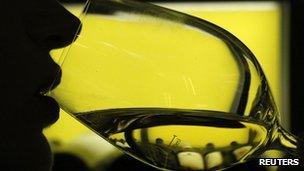Morning-after drink-driving arrests 'increase'
- Published

It takes about an hour for the body to break down one unit of alcohol, says the NHS
The number of motorists arrested for drink-driving the "morning after" has risen, police figures suggest.
Arrests between 06:00 and 08:00 rose from 350 in 2011 to 363 in 2012 - an increase of 4%, the data shows.
The figures from 22 of England and Wales' 45 police forces were obtained by a Freedom of Information Act and published by car insurers LV.
A separate survey by LV showed 46% of drivers did not realise how long it took for alcohol to leave the body.
One in five drivers surveyed thought they were "ok" to drive the morning after they had been drinking.
According to LV, "morning-after" drink-drivers are on average five hours away from being sober enough to drive when they get behind the wheel.
'Not fit to drive'
In the survey of 1,688 drivers:
37% said driving the following morning was "unavoidable"
26% said they were only going a short distance
7% thought it was acceptable to drive if they were not on a motorway
13% thought they were only slightly over the limit so it did not matter
It takes about an hour for the body to break down one unit of alcohol, NHS guidelines state. However this can vary depending on factors such as weight, age and sex.
With drink-driving arrests due to peak across the UK in the run up to Christmas, LV car insurance managing director John O'Roarke said: "It's easy to assume that after a good night's sleep you will be sober enough to drive the next day but, depending on how many units you've had, you may not be fit to drive.
"The key to enjoying the festive season is to plan ahead and don't drive if you are not within the legal alcohol limits."
The police data showed the most drunk person arrested so far this year was a motorist stopped by Bedfordshire police who was eight times over the limit.
It also showed that Thames Valley police made the highest number of arrests - 4,783 - for drink-driving between 2011 and 2012.
According to NHS figures, 230 people were killed as a result of drink-driving in 2011.
People convicted of drink-driving can be fined up to £5,000, be banned from driving for at least a year and even be given a prison sentence.
- Published12 August 2013
- Published9 July 2013
- Published10 June 2013